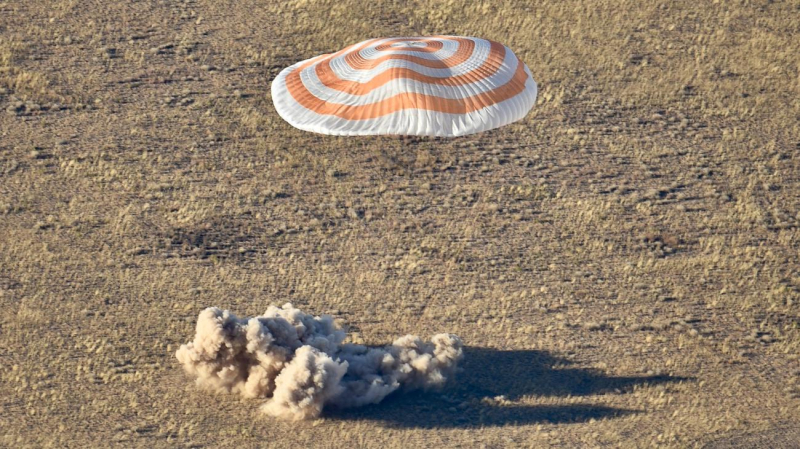ISS: Two Russian cosmonauts and an American astronaut return to Earth aboard the Soyuz spacecraft after 374 days in space




Shvets Nasa/AFP ISS: Two Russian cosmonauts and an American astronaut return to Earth aboard the Soyuz spacecraft after 374 days in space
Despite relations at a low point due to the war in Ukraine, cooperation between the United States and Russia in the field of space continues. Two Russian cosmonauts and an American astronaut from NASA landed yesterday, Monday, September 23, 2024, in Kazakhstan, after a record stay aboard the International Space Station (ISS). The return of the capsule of the Soyuz MS-25 spacecraft returns just 12 days after the takeoff of two Russians and an American to the ISS, once again aboard a Soyuz capsule. Despite the end of cooperation between NASA and Roskomos, these ships remain one of the only means, along with Space X's Crew Dragon, of transporting crews to the space station.
On September 11, a Soyuz ship with two Russians and an American on board took off from the Russian Baikonur cosmodrome in Kazakhstan to take this crew to the International Space Station (ISS). They were Alexei Ovchinin, Ivan Vagner, and NASA astronaut Donald Pettit.
The longest stay on the ISS
Yesterday, a similar crew landed at 5 p.m. local time in the same vast Asian country after spending 374 days in space, the longest mission aboard the ISS. The capsule of the Soyuz MS-25 spacecraft carried Russian cosmonauts Nikolai Chub and experienced cosmonaut Oleg Kononenko (60 years old), who took off at the end of 2023, and American Tracy Dyson, who took off in March 2024.
While Oleg Kononenko did not beat the absolute record for the longest stay in space, held by his compatriot Valeri Polyakov, who spent 438 days aboard the former space station “Mir” between 1994 and 1995, he now has a total of 1,111 days in orbit at the end of this trip into space, his fifth.
Despite Western sanctions against Russia for its invasion of Ukraine, which also resulted in the breakdown of the partnership between NASA and the Russian space agency Roscosmos, Soyuz spacecraft remain one of the only means of transferring crew to the ISS, including American astronauts.
But Washington has stepped up efforts in recent years to reduce its dependence on Russian Soyuz spacecraft, opting for American manufacturers such as Boeing or Elon Musk's SpaceX to transport its astronauts to the ISS.
Last June, two astronauts, Butch Wilmore and Suni Williams, left in Boeing's Starliner capsule. They were the first to take off aboard the American manufacturer's ship that was supposed to bring them back to Earth eight days later. However, once docked with the ISS, the ship encountered propulsion problems. NASA preferred an American solution, asking SpaceX and its ship to recover them in February 2025, eight months after their departure.
With the ISS set to disappear, Moscow turns to its allies
Space thus remains one of the rare sectors of fragile cooperation between the two countries. In late 2023, Roscosmos and NASA agreed to extend their joint flights to the International Space Station until 2025, “in order to maintain the reliability of the operation of the ISS in general” and to ensure the presence of at least one representative from both agencies on their respective segments of the station.
But this was a reprieve for this historic international cooperation, which is increasingly called upon to disappear, to the benefit of private or national stations, like the one that Moscow intends to build. Although the Russian space sector has been experiencing setbacks and pitfalls for several years, Russia maintains its ambitions, namely to replace the ISS with its own orbital station and resume missions to the Moon.
As for space cooperation, Moscow intends to turn to its Asian allies and neighbors, notably China, which has strengthened its space partnership with Russia, India, which already has its own space program, and Iran, whose latest advances in this area are raising concerns in the West.
You liked the article ? It mobilized our editorial staff, which lives only on your donations.
Information has a cost, especially since competition from subsidized editorial offices requires increased rigor and of professionalism.
With your support, France-Soir will continue to offer its articles for free because we believe that everyone should have access to free and independent information to form their own opinion.
You are the sine qua non condition for our existence, support us so that France-Soir remains the French media that allows the most legitimate voices to be expressed.
Recent Posts
The US court suspended the Trump administration's decision on “Voice of America”
< IMG SRC = "/Uploads/Blogs/53/C7/IB-FRC7HN1U8_EA2A6BBB1.jpg" Alt = "Court in the US suspended the action of…
Stars point to money. These zodiac signs can count on a financial breakthrough
For some, money is only a means to the goal, for others - a measure…
Astrologists indicated 2 zodiac signs that are not created for serious relationships
Not everyone dreams of a stable relationship, daily routine and common plans for the future.…
Simple hooligan trick. Thanks to this, the flowers will delight with the size
Spring is for gardeners not only the time of planting and cleaning, but also a…
These items from the PRL break price records. Check if you have them at home
In the times of the Polish People's Republic, getting anything was an art. < img…
Ukrainian Himera developers presented a new G1 Pro tactical right for the Armed Forces
< img src = "/uploads/blogs/A6/83/IB-FRC3CIQ3I_B2715237.jpg" Alt = "Ukrainian developers Himera presented a new tactical g1…